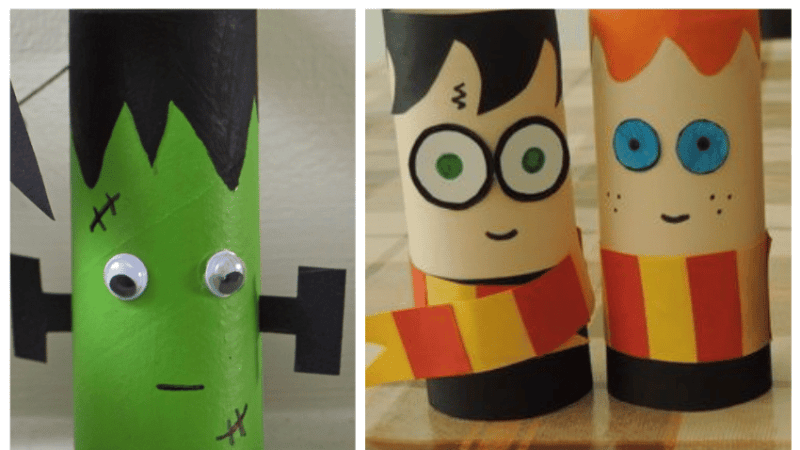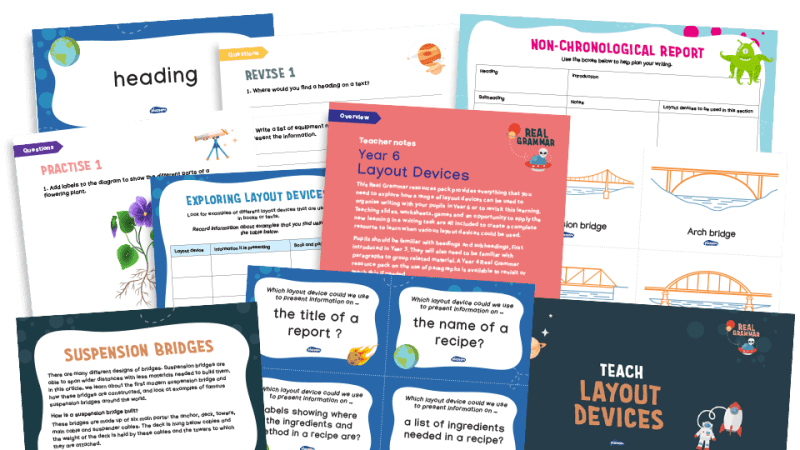English games KS3 – Best offline and online games

Boost secondary students’ English skills with these fun, free-to-play interactive games (both offline and online)…

- by Teachwire
- Classroom expertise and free resources for teachers
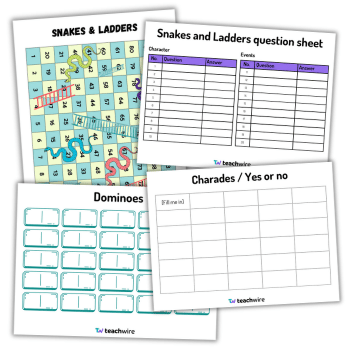
Using games in your English classroom is a great way to encourage students to make decisions, think creatively and explore ideas with others. The following English games KS3 ideas (and free printable resources) provide students with the space to deepen what they know about characters, events and themes.
What’s more, they’ll also help pupils get into the texts they read, pick apart ideas in those texts and, most of all, start conversations with their peers focusing on the topic they’re studying.
A good English game should encourage students to interact with each other’s ideas and develop depth in their learning experiences. Browse the following ideas by teacher Meera Chudasama. They’re all suitable for KS3 students, but there’s no limit on who can play these games.
Be confident in trialling games in the classroom – it’s a wonderful way for students to showcase what they know, while allowing you to get to know your learners better…
Classroom games to try
Snakes and ladders
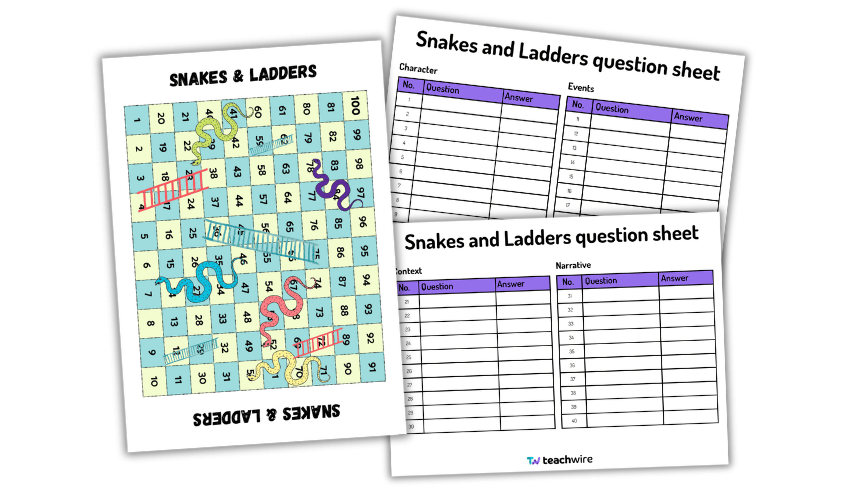
Number of players: Groups of two to four
Preparation: Print the board. Fill in the question sheets and print one for each group. Ask students to create a counter. You will need dice.
How to play
Print off our free snakes and ladders board onto card or A3 paper. Students can create counters for the game from paper or card, or use an object from their pencil case.
Snakes and ladders is an easy game for all abilities. But take it one step further by using the 100 squares that students land on to motivate questioning for a text you are reading or a topic you are studying.
The questions can get progressively more difficult or you can scaffold them to suit the ability of your class. Use the questions to help students show off the knowledge they’ve learnt throughout their course of study.
Use our editable PowerPoint to prepare your 100 questions, then print off a list for each pair or group.
Example questions based on your class novel
- Who is the writer of the story Maggot Moon?
- What year was the story written?
- Where was the story set?
When students advance in the game, your questions can become a little more difficult. For example:
- Can you recall one line from the story?
- Can you state one line said by Hector?
Post-it story starters
Number of players: Whole class
Preparation: Three different colours of sticky notes, whiteboard and whiteboard pen.
How to play
Use this game as a warm-up before creating stories in your classroom. Draw three boxes on the whiteboard and label each with a category:
- Character
- Event/obstacle
- Object
Amend these categories if you want to focus on different criteria. Each colour post-it note corresponds to a category. For example, orange relates to character, yellow to event and pink to object.
Give students two to three minutes to write on each post-it note (eg two minutes writing down a character on the orange note, then two minutes writing an event on the yellow note, etc).
After each round, ask students to stick their post-it on the whiteboard in the corresponding category. Once the whiteboard is filled with students’ ideas, pick three random post-it notes (one from each category) and give to one student.
Repeat this process until all students have three post-it notes from each category. They shouldn’t have their own ideas in front of them.
Students can now use these post-it notes to help them start their own story. They need to include each of the three ideas you’ve given them.
This activity connects students with the ideas they’ve contributed. They’ll also start to learn about each other’s prior knowledge. Ask students to share their stories aloud.
Charades
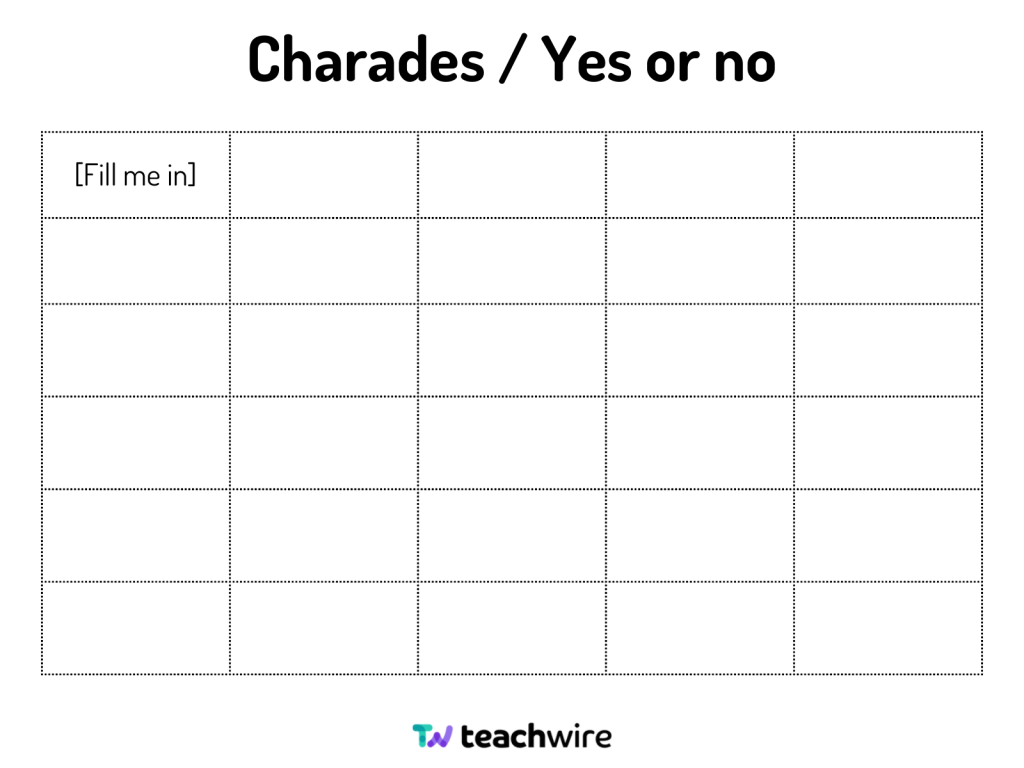
Number of players: Groups of six or whole class
Preparation: Fill in and print out 30-40 word cards.
How to play
Charades is a fantastic word-guessing game that gets everyone involved. How you play this classic collaborative game depends on the nature of your students. Do they like to verbalise answers? Do they like to perform? Are they itching to tell you every answer possible?
If so, charades is a great way for students to show their breadth of knowledge on a topic. For the game to be successful, it’s important that the word cards contain a range of characters, actions, themes and emotions from the topic you’re studying.
Card examples:
- Action: Stealing
- Action: Hiding
- Emotion: Sadness
- Theme: Romance
- Theme: Friendship
- Character: Bruno (The Boy in the Striped Pyjamas)
Book poetry
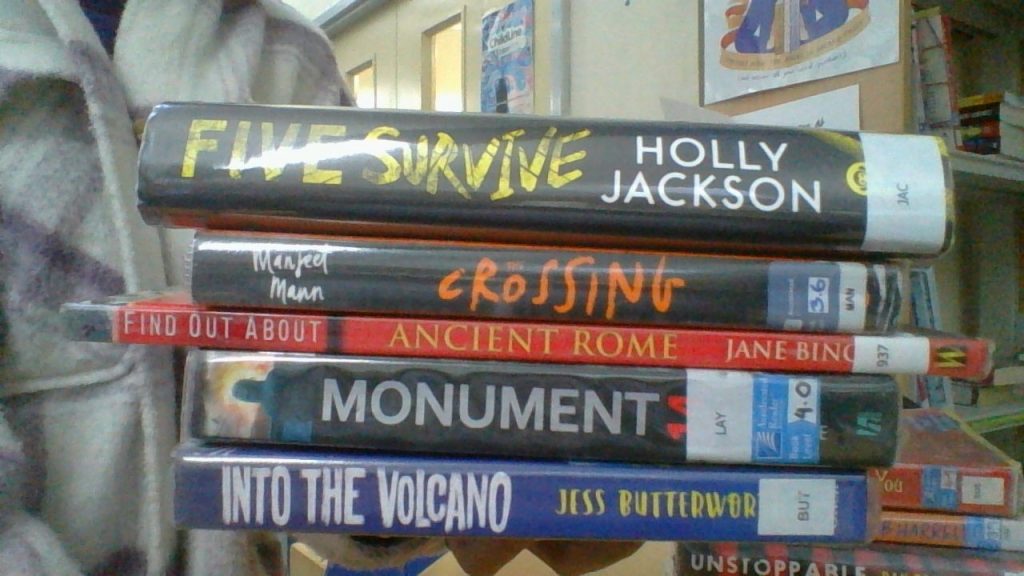
Number of players: Individuals or pairs
Preparation: Speak to your school librarian about using/returning books for this lesson.
How to play
This is a wonderful way for students to think creatively about the words authors use in book titles. It’s perfect for a library lesson.
For this game, students need to select five books and stack them to create a short poem. Theme the activity or let students’ creativity run wild.
Once they’ve finished, ask pupils to share their book poems with the class, then vote for your favourite poem. Take this activity one step further by tweeting your book title poems and tagging in the corresponding authors.
Musical quiz
Number of players: Whole class
Preparation: Create a clean playlist in advance and test your speakers.
How to play
In a similar vein to musical statues, play music from your playlist and stop it at random intervals. Once you stop the music, ask the class a question. Pupils can share their answers on mini whiteboards.
If a student answers correctly they stay in the game. If not, they are out. This is a quick and easy way to test students’ knowledge, from English literature to language.
Yes or no
Number of players: Groups of four-six
Preparation: Fill in 20 character/theme/narrative cards and print the amount you need. Use a timer on the board if you want to add a timed element.
How to play
This game is a fast and furious one! It will get students thinking creatively and test their knowledge of the topic they’re learning.
Fill in 20 cards beforehand and hand them out to your groups. Each player takes a turn to take a card. The other players take turns to ask ‘yes’ or ‘no’ questions to guess the word on the card.
Examples of yes/no questions
These questions are based on the story Lamb to the Slaughter by Roald Dahl:
- Did Mary Maloney kill her husband?
- Did Mary Maloney cook duck that evening?
- Did Patrick Maloney act suspicious that evening?
- Did he have a drink?
- Did Mary Maloney cook lamb that evening?
- Did Mary Maloney go to the local?
Guess who?
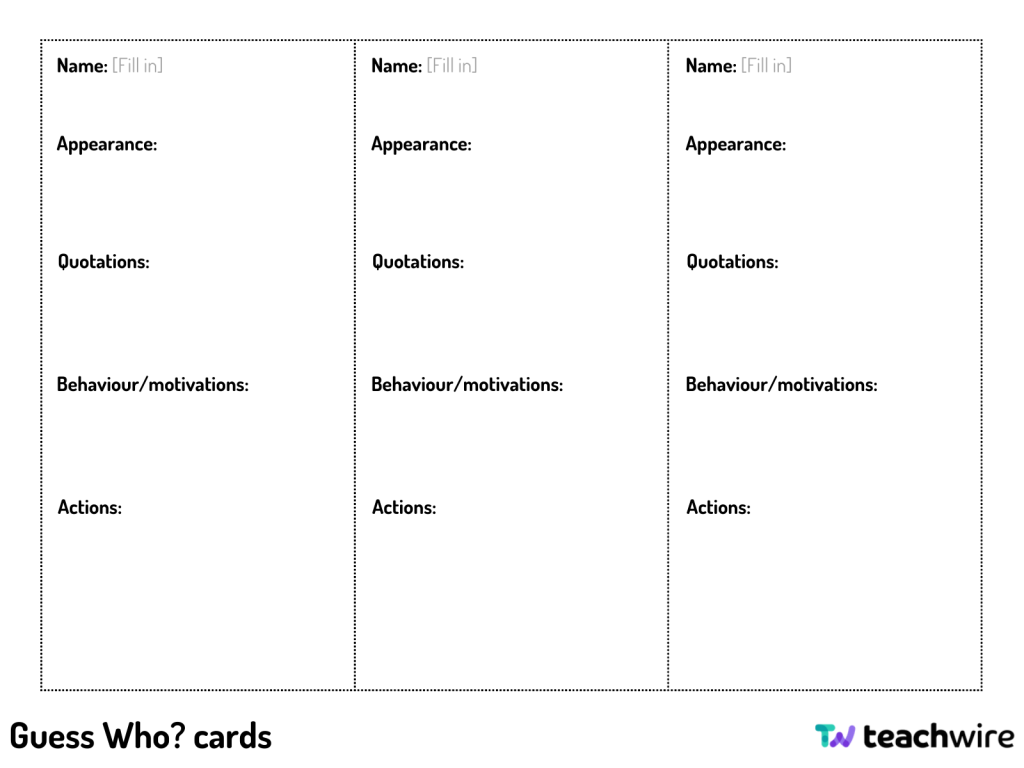
Number of players: Groups of four-six
Preparation: Write character cards and print the amount you need.
How to play
Guess Who? is a good game to develop character analysis for the novel you are reading. Create a pack of character cards with details about various characters, including their:
- appearance
- behaviour
- actions
- motivations
- quotations from the story
Add an image to help learners of different abilities. Each player takes a turn to choose a character card from the pack. Other players can only ask yes or no questions to guess the character.
When a player thinks they know who the character is, they can have a guess. If they guess wrong, they are out of the game.
Example character card
Here’s an example of a character card, based on The Landlady by Roald Dahl:
Name: Billy Weaver
Appearance: Suit
Quotations: “But is there a fairly cheap hotel not too far away from here?”
Behaviour: Polite, sweet, ambitious and caring.
Motivations: Wants to find a bed and breakfast so he can complete his job in Bath.
Actions: Suspicious of the landlady.
Snake it plenary
Number of players: Whole class
How to play
This is a five-minute plenary game that can quickly test students’ knowledge about the lesson you have taught. Each student has to say one idea. For example, you might ask them to say one adjective about a chosen character, theme or idea. Go around the room as quickly as you can. Any repetition and that student is out!
Jenga
Number of players: Groups of four-six
Preparation: You will need 3-4 Jenga sets or one giant Jenga set to play as a class. Write questions on each Jenga piece. Use a timer on the board to add a timed element.
How to play
To prepare for this game, write a question to test students’ subject knowledge or knowledge of your unit on each Jenga brick. You can also add ‘pass’ and ‘prize’ bricks to create a little incentive.
When a player takes a brick they answer the question. If they answer correctly, the brick goes back on the top of the pile. If they answer incorrectly they take another brick or they’re out of the game.
Murder mystery
Number of players: Groups of four-six
Preparation: Ask students to bring in objects or provide them yourself.
How to play
You can tweak and adapt this game to fit at the end of a unit. Alternatively, use it to introduce students to crime conventions in detective fiction or crime novels you are studying. It’s also a great game to spark creativity and can lead to creative writing opportunities.
Ask students to curate ‘murder mystery’ packs to get them thinking about language. Working in groups of four to six, each student is responsible for bringing in one object they want to feature in the murder mystery pack (this can be a box or an envelope).
Give students instructions about the kind of writing you want them to produce for players. For example:
- Narrative: The young boy next door has gone missing. Only the Mum and sister have been in the house.
- Two to three key characters: Mum, sister, best friend Tommy.
- Mystery object: A red sock left on the front porch
- Clue: The young boy’s footprints have been identified in a nearby park. One trainer belonging to the young boy has also been found.
A clear criteria keeps students focused on the task, especially as this could take more than one lesson. Ask students to swap murder mystery packs with each other, then students can complete a writing task based on the pack they receive. For example, they can:
- write a short story
- pen the boy’s diary entry
- write a record as if they were the detective
Punctuation bingo
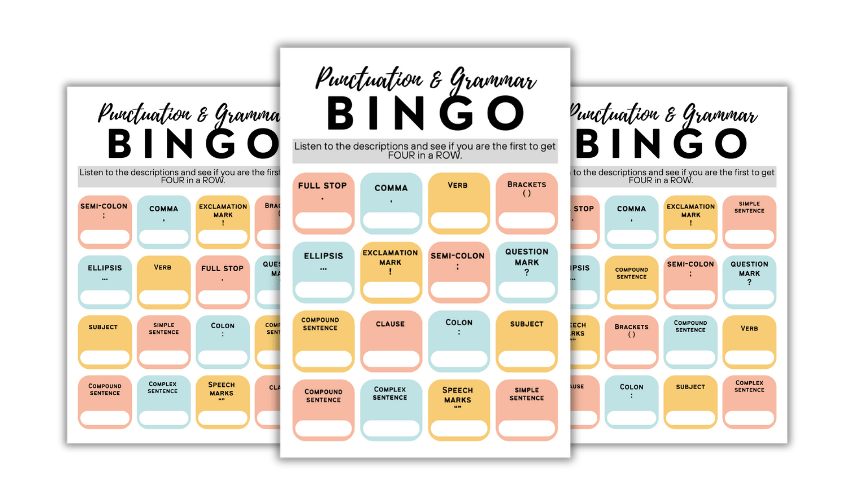
Number of players: Groups of four-six
Preparation: Write questions that correspond to the punctuation marks and grammar terms on our bingo sheets.
How to play
You can use and adapt bingo for any texts, topics or ideas. This example tackles punctuation. Each card has the same punctuation marks and grammar terms, but in different orders. All you have to do is write questions that correspond to the bingo cards.
Students will need to get four in a row: horizontally, vertically or diagonally. They then shout “BINGO!”. The first student to shout out could receive a prize. Try four or five rounds to keep the momentum going.
Example questions
- What piece of punctuation is used at the end of a sentence? (Full stop)
- What type of word describes an action? (Verb)
- Which piece of punctuation can replace a conjunction? (Semi-colon)
Mastermind
Number of players: Whole class
Preparation: Watch a clip of Mastermind on BBC iPlayer if students are unfamiliar with the gameshow. Prepare 10-20 questions on each of your chosen topics.
How to play
For this game you are setting expectations for students to be experts in the room. Focus your questions on the topic, novel or unit you are studying. Alternatively, this is a great way to test students’ knowledge at the end of the academic year.
Prepare 10-20 questions on your chosen topic. You can use the following structure for each round:
- 1: English topic/novel/unit
- 2: Subject-specific terms
- 3: General knowledge
Students with the highest score win or proceed to the next round. This game enable students to share their knowledge. They’re rewarded for their ability to recall information under timed conditions.
Dominoes
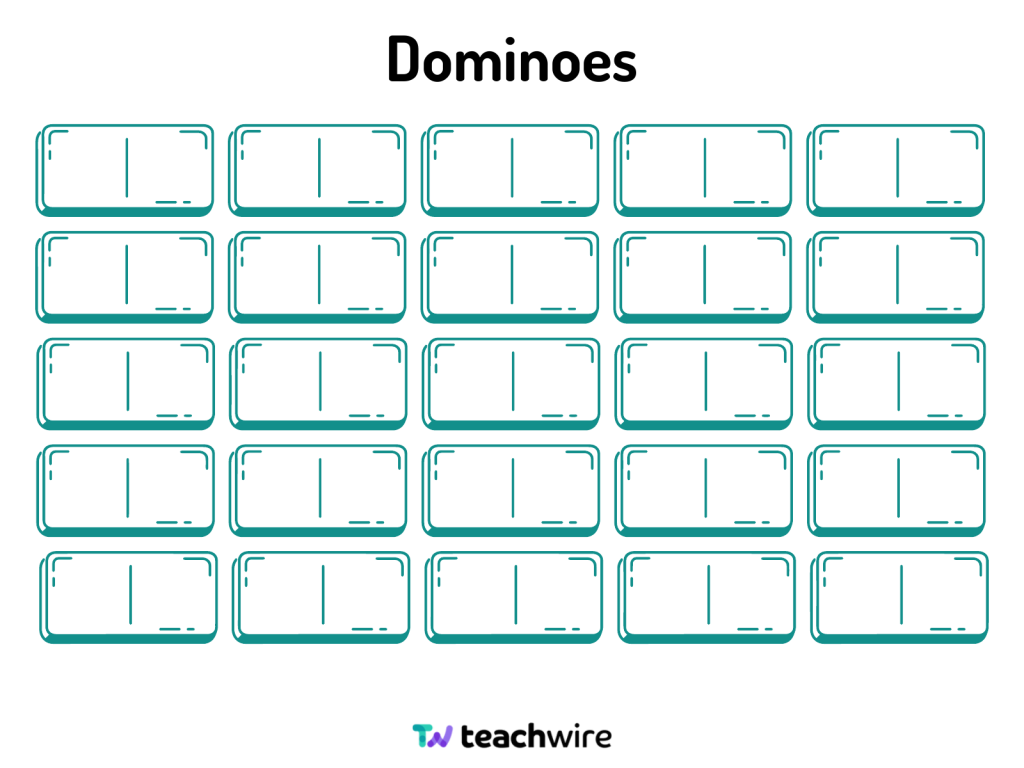
Number of players: Groups of four-five
Preparation: Fill in our dominoes template and print it out onto card. Laminate the dominoes if you want to protect them.
How to play
Dominoes are a great revision tool to support students’ study of a topic, novel or upcoming assessment. Fill in our dominoes with a question on one side and an answer/symbol on the other.
The objective of the game is for players to use all their dominoes first. Playing dominoes in this way makes students accountable to each other, as well as highlighting any gaps in their knowledge. This is useful before you move on to your next topic.
Example domino text
- Domino question: How many wishes does The Monkey’s Paw grant?
- Domino answer (on a different domino): Three wishes
Create board games
Give students clear and concise criteria of what is needed to make a successful board game:
- What type of game is it? Card/board/video?
- How do you win?
- What are the obstacles for players?
- Are there ways for players to progress quickly through the game?
- What resources do players need? (Cards/counters etc)
Resource the lesson with cards, pens and colouring pencils. Alternatively, book a computer room so students can create their brand and logo, or set these tasks for homework.
Laminate the completed games, if possible, to ensure they last longer than one use.
Meera Chudasama is an English, media and film studies teacher with a passion for design and research, and has developed course content for the Chartered College of Teaching. Follow her on Twitter at @MeeraChudasama.
Online English games for KS3
Wordwall
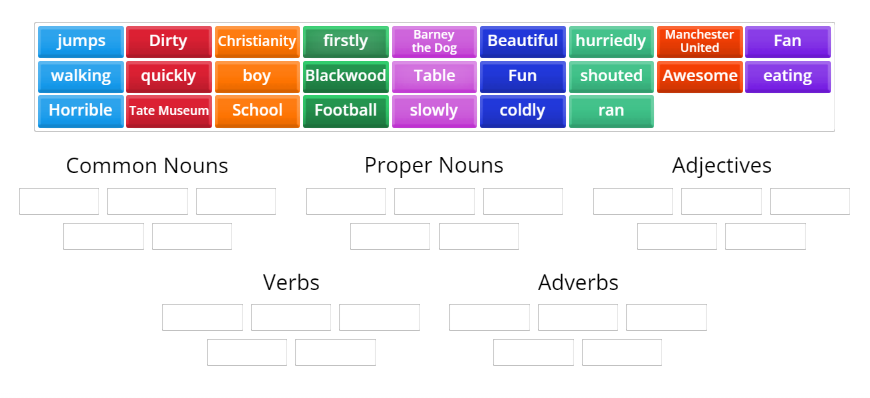
There are plenty of teacher-created KS3 English games resources to try at Wordwall. Try a sentence types match-up, a relative clauses and prepositions quiz or a nouns, adjectives, verbs and adverbs group sort.
Punctuation revision
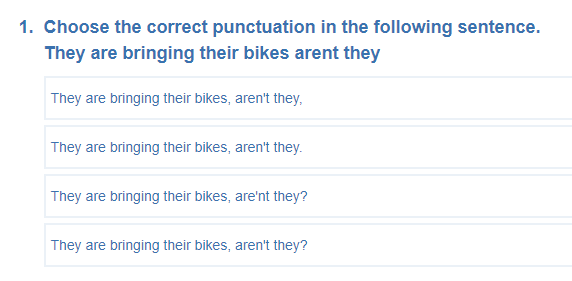
Encourage students to brush up on their punctuation skills with this ten-question KS3 revision quiz. Can they use commas, speech marks, colons, semicolons, full stops, exclamation marks, question marks and apostrophes correctly?
Boggle
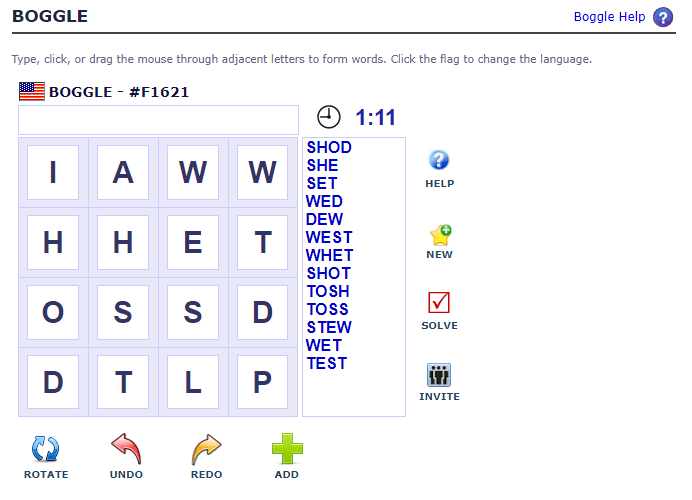
There are quite a few versions of the classic Boggle game online, but this one has the benefit of being able to turn off the timer if you want to, and allowing students to either type in the words or click the letters on the board.
Typing is great for getting lots of answers down quickly, but actually clicking the letters lets you explore possible avenues better, which seems to result in finding longer words hidden in the jumble.
It also offers you all possible solutions afterwards. So have dictionaries handy so you can answer: “What the hell is ‘pshawed’?” (‘Uttered an expression of disapproval’, apparently.)
If you’re after a downloadable Boggle resource you can play with your class, we’ve got this handy vocab starter game PowerPoint from Kat Howard you can try.
Name every preposition
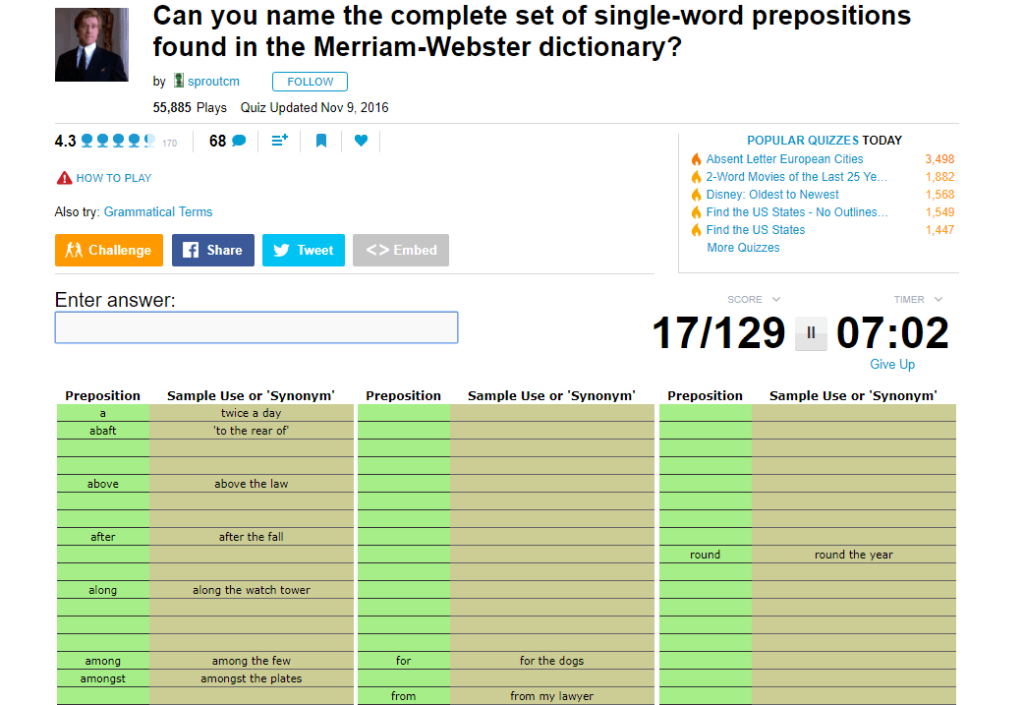
Sporcle is one of the best quiz sites around. Quizzes are user-submitted, so vary in quality, but if you stick to ones that have been Sporcle verified (this means the site admins have selected it to get promoted on the home page at some point) or unverified ones that have a good user rating, you can’t go far wrong.
There are loads of vocabulary ones you can find with a quick search (or just click here) that challenge you to match the correct definition to a group of words, all beginning with a certain letter, for example, or all having the same number of letters.
One of our favourites is naming every preposition. They’re listed in alphabetical order, which helps, but it’s still harder than you’d think.
Word Wipe
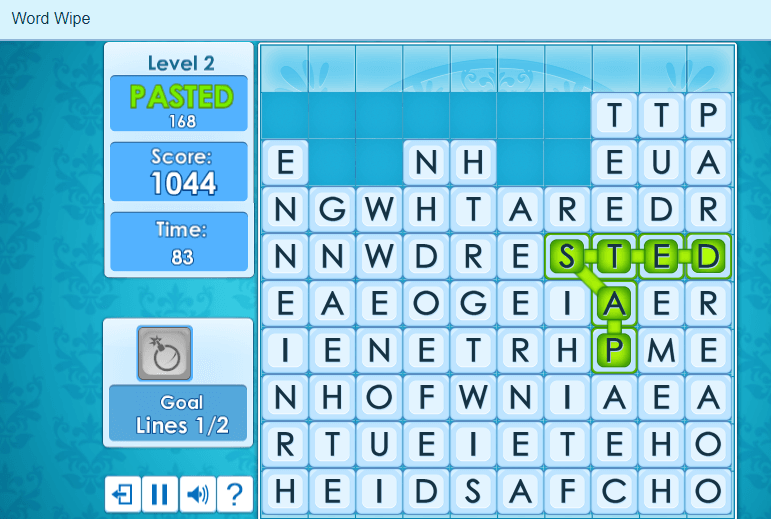
Word Wipe is somewhere between Boggle and Tetris, where you have to connect letters to make words, in order to clear the blocks and bring the lines down.
It’s super fun and addictive, so students are sure to enjoy – just be sure to keep an eye on how much time you’ve been playing!
Text twist
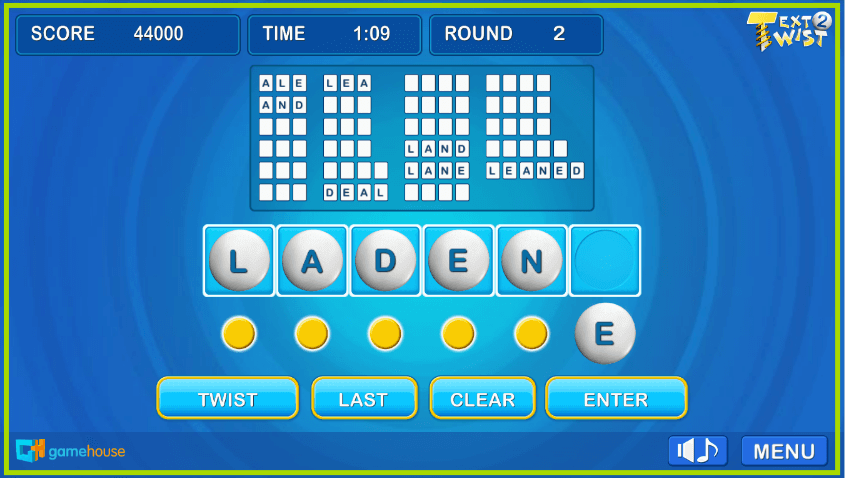
More anagram fun here. With each level you’re given a number of letters and have to make as many words as you can out of them. The main aim though is to find the one biggest word available to advance to the next round.
Three more classroom games to improve written work
Gemma Whitelock shares fun ways to boost pupils’ skills and confidence in articulating their thoughts and ideas…
Literacy Jenga
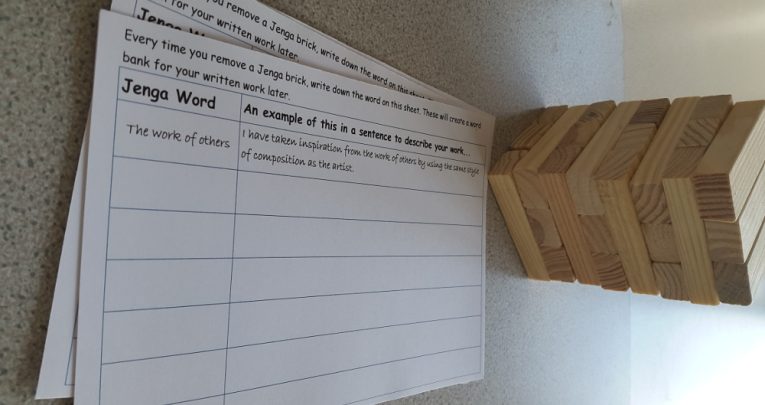
Admittedly, I thought this game was a little bit bonkers, but my mission for fun forced me to have a go anyway! This one really is brilliant and so adaptable for lots of different subjects.
So, how does it work? Write a word on each Jenga brick related to the written work you want pupils to do later. Students work in small groups and play the game as normal. But every time that they remove a brick, they write the word down for later use in their written work.
The game works well as a starter for a written lesson. My exam groups have enjoyed using it, particularly when they get into a bit of writing rut and struggle for inspiration.
Literacy loyalty cards
Many coffee shop have customer loyalty cards – buy ten items and you get some sort of ‘treat’. What if we did this for the students at school? What if they used certain words, connectives or topics of conversations within their work numerous times and we rewarded them for it?
This is exactly how a literacy loyalty cards scheme works. It is essentially a nicely presented list of keywords or phrases that students need to enhance their level of working. The more that they use, the more they are showing loyalty to their learning.
They simply tick off the ones they have used in one particular piece of work or over a certain period of time, then you reward them (you know, with merits, sweets and the like) for their efforts.
These have been a real eye-opener in my classes – and even created a competitive edge to written work! The lists also provide fabulously easy homework tasks as spelling revision too!
Keyword bingo
This game really is minimum effort, maximum engagement. My KS3 groups love bingo, so this one was a real game-changer for me. Using this as a starter gets students on board and excited about writing lessons.
If you have the cards printed and ready, all you need is a few prizes, whatever currency works for your groups (merits, stickers, sweets or maybe even Post-its).
Simply play a game of bingo, collecting words that correspond to the numbers on your game card. Then use the words within a written task.
It works well to keep the competitive theme going throughout the lesson. Why not give extra rewards to students who use all of their words?
This article is an extract from Gemma Whitelock’s book How to Create a Quirky Classroom. You can follow Gemma on Twitter at @mrsartytextiles.
Browse our round-up of SPaG games and spelling games. You can also take a look at our Year 8 English worksheets.






